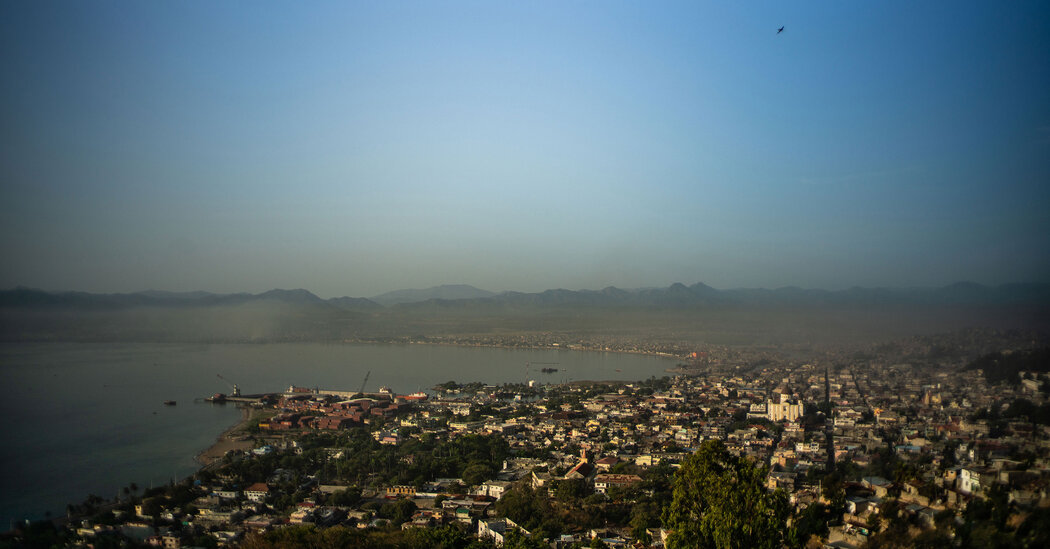
‘The Triumph of the Wolf’
An angry mob dragged Haiti’s president from the French Consulate and killed him in July 1915, part of the political upheaval Wall Street feared — and, some historians say, worsened by withholding money from the shaky Haitian government and seizing the gold.
American troops occupied the country the same day.
The invasion followed a detailed plan that the United States Navy had drawn up the previous year. American soldiers took over the presidential office and the customs houses that handled import and export taxes.
The Americans installed a puppet government, and by that fall Haiti had signed a treaty giving the United States full financial control. The United States appointed American officials, whom they called advisers, but the term hardly conveyed their true power: They oversaw Haiti’s revenue collection and approved, or denied, its expenses.
Martial law became the rule of the land. Private newspapers were muzzled and journalists jailed.
The Americans explained the invasion by saying Haiti was bound to fall to the Europeans, particularly Germany.
“If the United States had not assumed the responsibility, some other power would,” Secretary of State Lansing, who had replaced Bryan a month before the occupation, later said.
Lansing was also blinkered by racial prejudice. He once wrote that Black people were “ungovernable” and had “an inherent tendency to revert to savagery and to cast aside the shackles of civilization which are irksome to their physical nature.”
Racism shaped many aspects of the occupation. Many administrators appointed by the United States came from Southern states and made no bones about the worldview they brought with them.
John A. McIlhenny, an heir to Louisiana’s Tabasco sauce fortune who had fought in Theodore Roosevelt’s Rough Riders cavalry during the Spanish-American War, was appointed American financial adviser in 1919, with broad authority over Haiti’s budget.
At one official luncheon before his appointment, McIlhenny could not stop staring at a Haitian government minister because, as he later told Franklin D. Roosevelt, “that man would have brought $1,500 at auction in New Orleans in 1860 for stud purposes.”
Soon after the occupation, the American overseers started building roads to connect Haiti’s mountainous interior to its coast. To do so, they resurrected corvée, a 19th-century Haitian law for indentured labor.
The law required citizens to work on public works projects near their homes for a few days a year in lieu of paying taxes. But the American military, along with a constabulary it trained and oversaw, seized men and forced them to work far from home for no pay. Rich Haitians paid their way out of indentured labor, but the law entrapped the poor.
Haitians saw this as a return of slavery and revolted. Armed men, called cacos, fled to the mountains and began an insurgency against American forces. Laborers forced into corvée fled their captors and joined the fight. One leader of the cacos, Charlemagne Péralte, invoked Haiti’s revolution against France to call on his countrymen to “throw the invaders into the ocean.”
“The occupation has insulted us in every way,” read one poster plastered on walls in Port-au-Prince, the capital.
“Long live independence,” the poster read. “Down with the Americans!”
The United States responded forcefully. Soldiers bound workers in rope to keep them from fleeing. Anyone who attempted to escape corvée labor was treated like a deserter, and many were shot. As a warning, the Americans killed Péralte and distributed an image of his corpse tied to a door, evoking a crucifixion.
Leaked military documents from the time showed that the “indiscriminate killing of natives has gone on for some time,” with 3,250 Haitians killed. When Congress began investigating in 1921, the American military lowered the number, saying that 2,250 Haitians had been killed in the occupation, a figure Haitian officials denounced as an undercount. As many as 16 American soldiers died, as well.
“It was a strict military regime, the triumph of the wolf,” Antoine Bervin, a Haitian journalist and diplomat, wrote in 1936.
The first few years after the invasion brought little economic benefit to Haiti. American advisers appointed by the United States president collected up to 5 percent of Haiti’s total revenues in salaries and expenses — more, at times, than the spending on public health for the entire country.
In 1917, the United States directed Haiti’s National Assembly to ratify a new Constitution to allow foreigners to own land. Since independence, Haitians had outlawed foreign land ownership as a symbol of their freedom and a bulwark against invasion.
When Haitian lawmakers refused to change the Constitution, General Butler dissolved parliament by what he called “genuinely Marine Corps methods”: Soldiers marched into the National Assembly and forced lawmakers to disperse at gunpoint. The Americans then pushed through a new Constitution that Franklin Roosevelt later claimed at a campaign rally to have written himself.
American businesses leased thousands of acres of land for plantations, forcing farmers to either serve as cheap labor at home or migrate to neighboring countries for better pay. The Haitian-American Sugar Company once boasted to investors that it paid only 20 cents for a day’s worth of labor in Haiti, compared with $1.75 in Cuba.
According to the Haitian historian Suzy Castor, women and children in Haiti were paid 10 cents a day.
Displaced farmers went to Cuba and the Dominican Republic, setting off what some historians say is the most lasting effect of the American occupation: the mass migration of Haitians to other countries in the Americas.
“This is the big legacy,” said Weibert Arthus, Haiti’s ambassador to Canada and a historian.
As Secretary of State Bryan suggested in his letter before the invasion, Farnham was not satisfied with a share of Haiti’s national bank, so he worked with the State Department to orchestrate a full takeover. By 1920, National City Bank had bought out all shares of the national bank for $1.4 million, effectively replacing the French as the dominant financial power in Haiti.
With Haiti’s national bank under his control, and the troops protecting American interests, Farnham began acting like an official envoy himself, often traveling aboard American warships, historians say.
“The word of Mr. Farnham supersedes that of anybody else on the island,” wrote James Weldon Johnson, the executive secretary of the National Association for the Advancement of Colored People, who visited Haiti in 1920.
Farnham was also not shy about his views on Haiti and its people.
“The Haitian can be taught to become a good and efficient laborer,” he told senators investigating the occupation. “If let alone by the military chiefs he is as peaceful as a child, and as harmless.”
“In fact,” he continued, “today there are nothing but grown-up children.”




